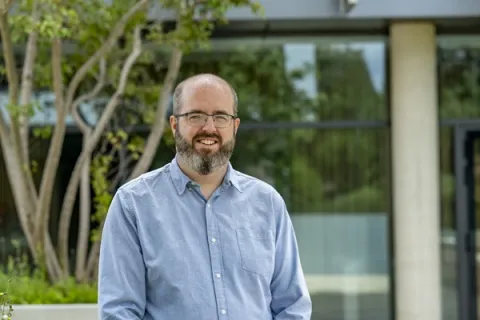About the project
Ready to revolutionize microfabrication? Traditional gallium ion sources limit ion beam flexibility, but Ionic Liquid Ion Sources (ILIS) unleash a vast variety of ions for precision etching. Southampton’s cutting-edge PhD project, in partnership with Thermo Fisher, explores ILIS fundamentals—pioneering next-gen focused ion beam technology for unmatched etching control.
Gallium Liquid Metal Ion Sources (LMIS) are the standard choice for ion beam material etching, facilitating ion beam lithography as the go-to technique for in situ microfabrication. Many microfabrication applications would benefit though from a more flexible ion beam source, with different ion beam species significantly influencing the physical and chemical nature of the milling results, for example reducing ion implantation or enhancing etching through using chemically reactive ions.
One such option is Ionic Liquid Ion Sources (ILIS), where rather than extracting ions from a liquid metal such as gallium, molecular ions can be extracted from an ionic liquid. Through the use of ionic liquids, there is a far greater choice of ion type that can be emitted, across a much larger range, offering the ultimate flexible ion source. Recently there have been great improvement in the operation of ILIS's through the development of their use for ion thrusters for spacecraft.
Our research group at Southampton has developed an electrospray ion thruster for micro spacecraft propulsion, and have over the last several years investigated it as an etching tool, in a broad manner, as part of an EPSRC funded project.
This PhD will develop this concept further, where in collaboration with Thermo Fisher Scientific (the World lead in Focused Ion Beam systems) we will develop such a system specifically for etching processes within focused ion beam columns.
You will investigate the fundamentals of ion emission from an Ionic Liquid Ion Source, investigating the properties of the beam using various diagnostic techniques, using the excellent facilities at the David Fearn Electric Propulsion Laboratory.
The PhD studentship will focus on experimental investigating fundamental aspects of ILIS's. Particular emphasis will be put on gaining insight into the ion emission process, the use of novel ion liquids, and greater understanding of the etching process.
Training in the experimental testing of ion beams, relevant to applications including ion etching to spacecraft propulsion.
The School of Engineering is committed to promoting equality, diversity inclusivity as demonstrated by our Athena SWAN award. We welcome all applicants regardless of their gender, ethnicity, disability, sexual orientation or age, and will give full consideration to applicants seeking flexible working patterns and those who have taken a career break. The University has a generous maternity policy, onsite childcare facilities, and offers a range of benefits to help ensure employees’ well-being and work-life balance. The University of Southampton is committed to sustainability and has been awarded the Platinum EcoAward.

